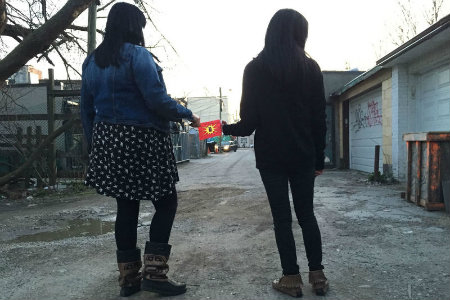When the words missing and murdered, truth and reconciliation, occupation and resistance are everywhere, how do two Mohawk women stand their ground? Two Indians is a darkly comedic look at the landscape of being Indigenous.
To find out more about this piece by Salt Baby Collective, I took the liberty to ask Falen Johnson (Writer of the play) and Jessica Carmichael (Director) a few questions. In the midst of their run at SummerWorks, this is what they shared.
HM: Salt Baby Collective aims to tell stories from an Indigenous perspective. How much of this show’s story is taken from personal experience?
Fallen (FJ): Much the story of Two Indians is taken from personal experience, as well as observations. I have woven some first hand experiences into the piece; as well as, used those experiences as jumping off places to help flesh out the story. So I guess you could say there is a mix of reality as well as fiction.
Jessica (JC): This is an incredibly personal story written by Falen. Falen brought her formative years growing up in Six Nations, as well as her experience of moving to the city to attend theatre school, and subsequent time after into writing this piece. The piece resonates quite personally as it brings two cousins together to discuss their complex past and the issues they face as Indigenous young people making different choices about how and where they experience their heritage. Falen writes from a raw and vulnerable place that is meant to allow us to question our personal politics and values in our day to day relationships and interactions with the world around us.
HM : When working out how to bring the story to the stage, how important was it that you add some humour into the mix, even if it is dark humour?
FJ: As a First Nations person, humour is deeply imbedded in our culture. This is is generally chalked up to survival – humour as a mechanism for survival. As a population who suffered through an attempted genocide, we need to laugh and find humour to keep going. It comes from an inherently dark place. So it seems fitting that there is frequently an edge to that humour. I use humour in my writing as a way to allow the teaching to get in. It is my sneaky writer trick. Comedy, humour, and laughter can crack an audience open. They feel at ease and then once they are open, the teaching or the hard things that I am trying to convey, can sneak in.
JC: Working with Falen’s impulses to bring humour to the piece allows for a balanced contrast to help the deeper social and personal issues land. Where too there is laughter, there is the questioning for the audience member as to why we are laughing: is it okay to laugh? Am I the only one laughing? Is this wrong to laugh? Laughter feels good right now, because these are some absurd rules our society has created and lived by for too long… oh shit, I just laughed and now am nodding in agreement with my own discomfort that hopefully I am okay with feeling… and that makes for a complex and full theatrical experience. For me, dark humour sometimes allows me to make sense of the pain in a way that just sitting in it can’t. Dark humour allows some distance but also complicates the experience because I have to ask why does it make me laugh and what does it say about me?
HM: After SummerWorks, where will Two Indians travel next?
FJ: We don’t have an firm plans for Two Indians as of yet. I’d love to see the piece tour. Taking work to Indigenous communities is a big passion of mine. And it is always my hope to take my work back to my community of Six Nations. Presenting my work there is always extremely rewarding. I love to go home.
JC: Our hope is that the piece will garner interest by some of the larger theatre companies across the country.
In their own words, literally… we are at a time where Indigenous stories are much needed. Be sure to make time to see Two Indians at SummerWorks. It has three more showings, until Saturday, August 13th. For tickets and info, go to summerworks.ca.






